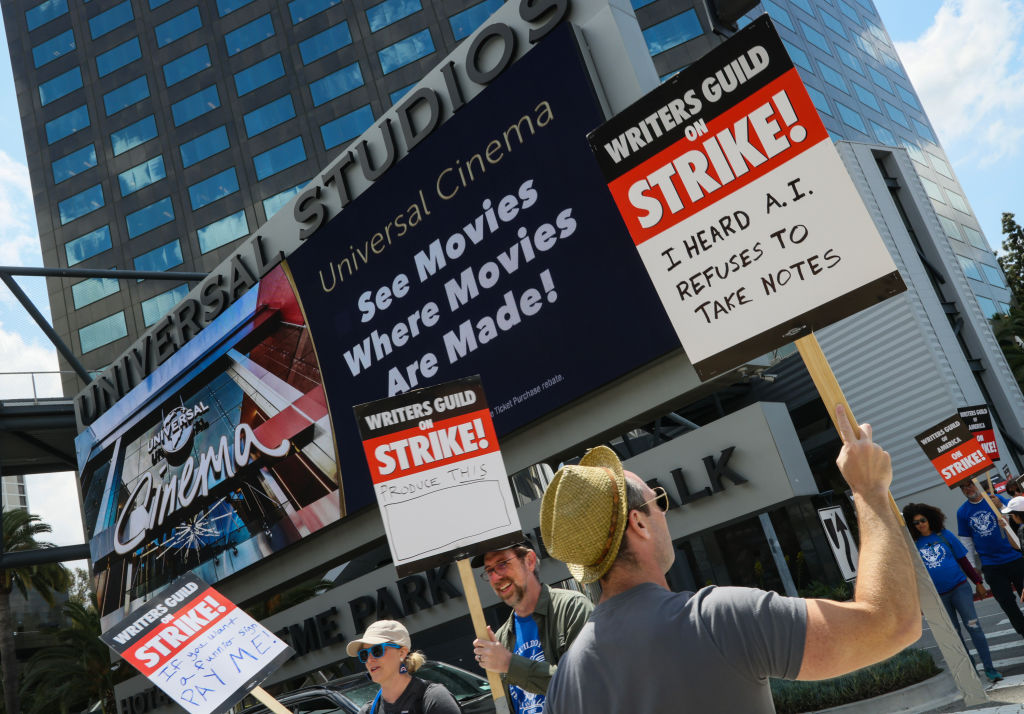
The last time the Writers Guild of America went on strike, in 2007, workers pushed back against the nascent streaming industry, advocating for higher residual payments for content released over streaming. Now a new technology, artificial intelligence, stands to drastically change Hollywood again as Guild strikers return to the picket line.
Streaming giants like Hulu, Netflix, and Disney+ have come to dominate the industry, changing the models by which content is produced and distributed and making it increasingly difficult for writers to earn a sustainable income. And as artificial intelligence technology rapidly improves, the WGA aims to place limits on the use of AI in movies and TV scripts.
The Alliance of Motion Picture and Television Producers (AMPTP) —which is negotiating the contract on behalf of Hollywood studios, streamers, and production companies—say their priority is “the long-term health and stability of the industry” and they are dedicated to reaching “a fair and reasonable agreement” according to the Associated Press.
“AI raises hard, important creative and legal questions for everyone…” the AMPTP said in an emailed statement to TIME. “It’s something that requires a lot more discussion, which we’ve committed to doing.”
The WGA proposed regulations around the use of AI to create source material and write, or rewrite, literary material. A negotiations proposal chart released by WGA on Monday shows that AMPTP rejected their proposal, instead countering with “annual meetings to discuss advancements in technology.” (The WGA did not respond to requests for comment as of publication.)
A Pivotal Moment
The battle over AI is just one aspect of the union’s demands around ensuring fair compensation in the streaming age. (The guild’s top priorities are fighting for increased compensation and residuals.) But any limits on AI technology, or lack thereof, have the possibility to impact the future of the industry for decades to come—especially as tools powered by artificial intelligence becomes increasingly commercialized.
“Politically, we are at the precipice of when [AI technology] will be institutionalized.” says Alex Hanna, Director of Research at the Distributed AI Research Institute. “Once they are institutionalized, it’s hard to get rid of it.”
Though AI technology is not new, it has rapidly become mainstream, as companies push to adopt the technology. “[We’re seeing a] rapid push to release these systems into commercial use, often without very much pre-testing or evaluation of whether they even work as planned,” says Sarah Myers West, Managing Director of AI Now Institute.
Jobs on the Line?
The commercial adoption is raising questions across sectors about the potential for job cuts. “It’s not so much about what AI is going to do, but what companies are going to use AI to justify,” says Myers West. Studios could have fewer people in the writers’ room, with generative AI writing content that is later edited by a writer. “They could use AI to create a first draft and then bring in someone else to do a second draft. And that devalues their work by not having them do that whole process,” says Meyers West.
Experts say that the technology is not yet advanced enough to replace a writer entirely, but it could reduce a creative practice into something akin to copywriting. “AI isn’t necessarily going to replace the job, but it would make it more mundane,” says Meyers West.
A Challenge Across Industries
In recent months, creatives across industries have been sounding the alarm on the encroachment of artificial intelligence. Many artificial intelligence systems use the work of creatives to teach the tools to generate something similar, raising concerns around intellectual property.
The Screen Actors Guild-American Federation of Television and Radio Artists (SAG-AFTRA) released a statement in March requiring the bargaining of the use of artificial intelligence to simulate an actor’s performance, noting that “human creators are the foundation of the creative industries and we must ensure that they are respected and paid for their work.” And just a week after Universal Music Group asked services to prevent AI companies from “scraping” music to create imitations, an AI-created Drake and The Weeknd collab fooled the Internet.
Though WGA is one of the first creative labor unions to take on AI, it’s likely to be joined by others soon. “I imagine we’ll see more of this in fields like journalism or graphic design, positions that could be automated with intense human correction afterwards,” says Hanna.
More Must-Reads from TIME
- Inside Elon Musk’s War on Washington
- Why Do More Young Adults Have Cancer?
- Colman Domingo Leads With Radical Love
- 11 New Books to Read in February
- How to Get Better at Doing Things Alone
- Cecily Strong on Goober the Clown
- Column: The Rise of America’s Broligarchy
- Introducing the 2025 Closers
Write to Simmone Shah at simmone.shah@time.com